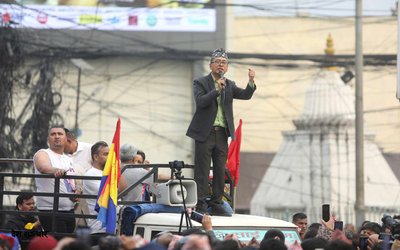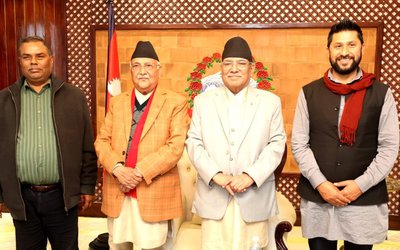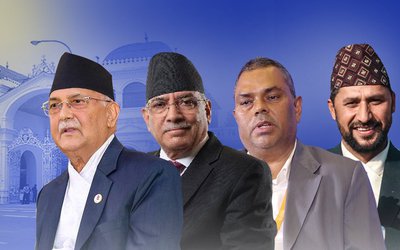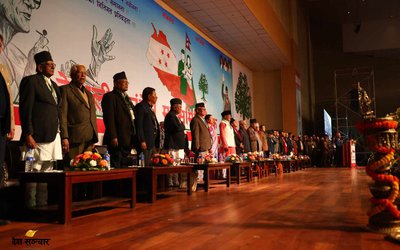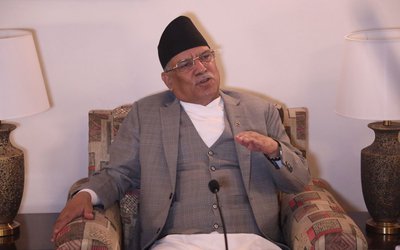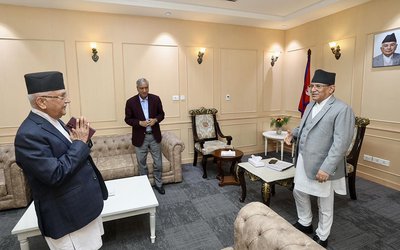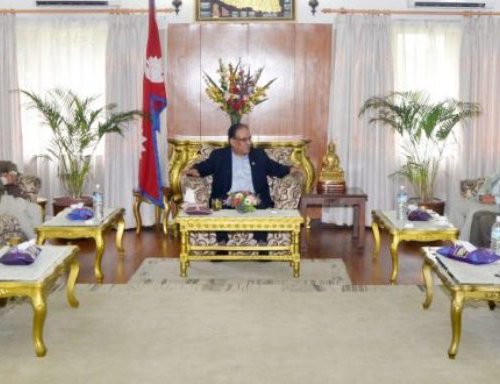
When there is rain in the foothills of the Himalays, there is flood in the Indian plains. Wild animals of both the countries frequently cross paths and create lots of problems for the peoples living in these countries.
Along with water and animals, Nepalese and Indian people frequently visit each other for spiritual reasons as they share common religions and common cultures. Similarly, there are families in relations living in both the countries.
Even the priest of Pashupatinath Temple and its forms of worship are decided by Shankaracharyas of India. They are the supreme authorities to decide on the issue of Pashupatinath’s worship and other day-by-day affairs, including the restoration of the temple.
From eastern parts of the Nepalese border with Sikkim State to far-western Nepal and Uttarakhanda and southern plains to Indian state and Kathmandu elites with Indian elites, there are strong family ties established through matrimony. From religion to culture, geography to nature, trade to water, politics to Nepal-India relations, there are thousands of dimensions bonding the two countries.
No two countries in the world are so similar as are Nepal and India. Basically, Nepal and India are one civilization and two nations.
As Nepalese prime minister Pushpa Kamal Dahal is paying an official visit to India, these issues are in the backburner of his agenda. As many temples including Pashupatinath, damaged by earthquakes need renovation, the people living in border areas are facing problems, floods are creating havocs to peoples of both the countries, the debates in Kathmandu, not to sign any agreement, show no regard to these realities.
The Ministry of Foreign Affairs, in a press release, only says Prime Minister Pushpa Kamal Dahal 'Prachanda' is paying a State Visit to India from September 15 to 18, 2016 at the cordial invitation from Prime Minister of India Narendra Modi.
The delegation members include foreign minister Prakash Sharan Mahat, physical infrastructure and transport minister, Ramesh Lekhak, members of the Legislature-Parliament, secretaries and other officials from different ministries and representatives of business community.
Following the declaration of Nepal as a republic, many Nepalese prime ministers have visited India. However, people have not got the opportunity to listen about their closeness of relations from political and bureaucratic leaders.
Prime Minister Dahal is not an exception. Tied by nature, religion and culture, Nepal-India relations have a unique character at the people's level. As politicians are spoiling the relations, it is gradually confusing the people.
With the opinions controlled by a few thousand communist radicals, who thrived in anti-Indian propaganda, Nepal-India natural relations have never been discussed or debated on their real ground.
“Symbols alone cannot operalise relations. They are based on reality. One cannot change the existing realities between the two countries,” said Professor Dr. Lok Raj Baral. "Reality guides the bilateral relations. This visit is not exception.”
However, Prime Minister Dahal, who himself is a leader of radical Maoist Center, is speaking words, which convince his radical supporters. In such a situation, no sage is required to predict the outcome of forthcoming India visit of prime minister Prachanda.
“Trust me. I will not sign any treaty and agreement against Nepal’s interest in India,” said Dahal, in meetings before leaving for India. From Parliament to public functions and party’s internal meeting to his personal meeting, Prachanda has been reiterating this statement.
A month before his scheduled visit, Prime Minister Dahal started to attend various programs, riding populist bandwagons and undermining existing century old relations at the people-to-people level.
Surrounded by radical communist zealots, Prachanda has a difficult time to maintain balance. On the eve of his visit, Prachanda is giving an impression to his cadres that he is more anti-Indian than the rest of political leaders including UML leader KP Sharma Oli.
“I will not sign any agreement against national interest,” thundered PM Dahal addressing his party workers and intellectuals maintaining his anti-Indian posture which majority of his party workers consider nationalist.
Prime Minister Dahal is showing his extreme posture looking at the Indian masses and Indian leadership. Here he seems to be more pragmatic and realistic.
“Modiji and I think in similar ways, we have chemistry,” said Prachanda in his interview to Indian newspaper Hindustan Times on the eve of his visit.
However, prime minister Prachanda himself is issuing controversial and contradictory statements. At a time when no Indian political leaders are tightlipped, Prime Minister Prachanda is speaking volumes.
“The past year has not been good for Nepal-India ties. I personally trust Prime Minister Narendra Modi to build the trust,” said Prachanda in his interview to Hindustan, HT’s sister publication. “Modiji and I think in similar ways, and we have chemistry. There is a difference in circumstances and our ideology, but that is a different issue. He is a strong Prime Minister, elected with a majority, of a country as big as India…Both Nepali people and I trust Modiji. Now we have to pay attention and strengthen this trust,” he said.
With his party cadres and opposition leaders, Prime Minister Dahal showed up as a vocal patriot and used every word to defend his stand. As long as Nepal has a leader with such understanding of large areas of commonalities and is able to speak the reality, Nepal-India relations cannot thrive whoever visits India.
Given the present state of Nepal with the radical communists dominating all spheres of society, nothing can move at political level. However, the political level relations cannot change Nepal and India’s natural course and human-human to human and nature to nature relations.

Keshab Poudel
Poudel is the editor of New Spotlight Magazine.
- CLA: Samriddhi For Skill Development
- Apr 23, 2024
- ECONOMY: Growth At 3.3
- Apr 16, 2024
- DPM’s SHRESTHA’S CHINA VISIT High Profile, Low Key
- Apr 14, 2024
- Maha Kumbha In Barahkshetra: A Sacred Festival In Sacred Koshi (Kaushiki) River
- Apr 09, 2024
- LOSS AND DAMAGE: Upper Tamakoshi A Case
- Apr 02, 2024

